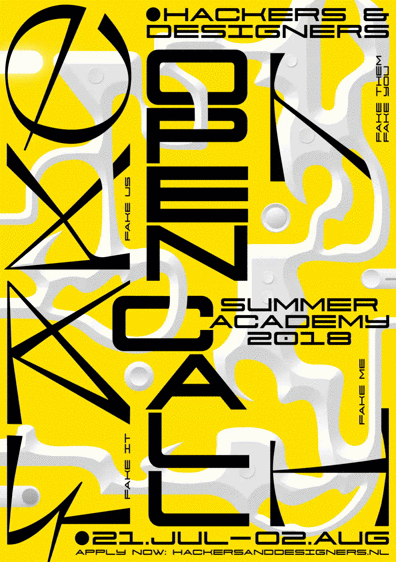Summer Academy 2018: Open call for participation: Difference between revisions
No edit summary |
|||
| Line 27: | Line 27: | ||
* You will receive an email with a template document, which you can use for your submission, including a short description of your workshop topic, workshop schedule, the expected outcome, what participants will learn, what materials and equipment you will need, how you are going to document/publish/share the workshop outcome. | * You will receive an email with a template document, which you can use for your submission, including a short description of your workshop topic, workshop schedule, the expected outcome, what participants will learn, what materials and equipment you will need, how you are going to document/publish/share the workshop outcome. | ||
* You submit your proposal by 28th of April. | * You submit your proposal by 28th of April. | ||
* You will then receive two proposals from peers to review. | * You will then receive two proposals from peers to review between May 14th and May 20th. | ||
* You will get the chance to process the feedback from the peer review. | * You will get the chance to process the feedback from the peer review. | ||
* By May 30th we will be announce the final program. | * By May 30th we will be announce the final program. | ||
Revision as of 16:37, 11 April 2018
| Summer Academy 2018: Open call for participation | |
|---|---|
| Name | Summer Academy 2018: Open call for participation |
| Location | DekWest, Amsterdam |
| Date | 2018/04/10-2018/04/28 |
| Time | [[]] |
| PeopleOrganisations | |
| Type | HDSA2018 |
| Web | Yes |
| Yes | |
Are you interested in exploring the boundaries of existing technology, programming platforms, online/offline networks, and user experiences? (e.g. webware, hardware, software, internet, IPFS, darknet, peer 2 peer, blockchain, bot networks) Are you thinking through making? Are you looking for new challenges and cross-disciplinary collaboration? Submit a workshop proposal!
The H&D Summer Academy of 2018 (HDSA2018) includes a variety of workshops, lectures, a film night and publishing activities. The program addresses hackers/designers/makers/artists who are not afraid to open, break or rethink software and hardware, learning by doing, and recognize the importance of researching the various consequences that arise in our contemporary information society.
BYOW (Bring you own workshop)
Tips for submitting workshop proposals
- Proposed workshop formats are: 1/2 day, 1-day, or 2-days. Shorter intermission are also possible for newbies.
- Hands-on means of production should stay central during the workshop.
- The proposal should cover aspects of design, artistic research, and programming. If you need support on one of the aspects, consider finding a collaborator via the H&D network.
- Giving a workshop can be quite intensive. We therefore advise to collaborate with 1 or 2 people on submitting proposals.
How to submit
- Sign up on our Typeform
- You will receive an email with a template document, which you can use for your submission, including a short description of your workshop topic, workshop schedule, the expected outcome, what participants will learn, what materials and equipment you will need, how you are going to document/publish/share the workshop outcome.
- You submit your proposal by 28th of April.
- You will then receive two proposals from peers to review between May 14th and May 20th.
- You will get the chance to process the feedback from the peer review.
- By May 30th we will be announce the final program.
About the H&D Summer Academy 2018
Questioning “the liberal promise of the Internet as a distributed mass communication tool”1 H&D promotes hands-on making, cross-disciplinary collaboration and encounters with technology as means of ‘going public’ and uses the H&D Summer Academy as an occasion to discuss and question proprietary software and closed systems. The workshops of the HDSA2018 shall function as satellites reaching a wider audience outside of the maker-space itself to pose questions such as: Who owns information? Who directs data flows and who enables or limits access to information? Living and working in a post-truth reality how can we stay or become informed users and critical makers? Can we (re)build independent environments that shape our future practices? How can the practice of ‘critical making’2 enable citizens to take part in debates around complex matters such as machine learning?
-
